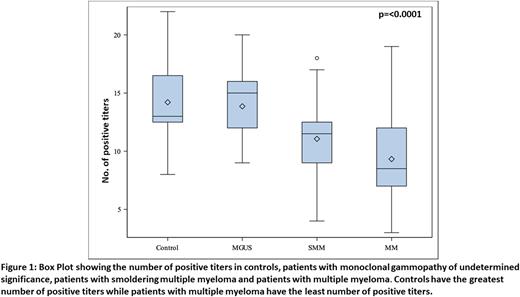Abstract
Background: Recent studies have estimated that infections occur with increased risk in patients with plasma cell disorders as compared to the general population. Our group has previously shown that patients who show response to vaccination following autologous hematopoietic stem cell transplantation (AHCT) have better overall survival and progression free survival than those who do not. In clinical practice, antibody titers against pathogens that are targeted by vaccines are measured infrequently in patients with monoclonal gammopathy of undetermined significance (MGUS), smoldering multiple myeloma (SMM) and multiple myeloma (MM) at the time of diagnosis. Moreover, studies have previously shown that AHCT and maintenance therapy can cause seroconversion of titers in MM patients but the effect of induction chemotherapy on seroconversion of antibody titers is unknown.
Methods: The study population comprised of controls and patients with plasma cell disorders who were seen at Roswell Park Comprehensive Cancer Center from 2018-2022. Controls were defined as patients consulted to our service to rule out gammopathies but found to be negative on initial testing. Immunoparesis was defined as deficiency of uninvolved immunoglobulins. All individuals had antibody titers tested at the time of first diagnosis. Patients with MM who underwent induction chemotherapy followed by AHCT had antibody titers tested prior to AHCT. Serological titers were measured according to Roswell Park Central Clinical Laboratory standards. Interpretation of individual titer results was in accordance with the manufacturers’ recommendations and published literature. Differences of the titers were compared by non-parametric Kruskal-Wallis Test /General Linear Regression Model (for continuous variables) and Fisher's Exact Test. SAS version 9.4 (SAS Institute, Cary, NC) was used for statistical analyses. All tests were two-sided and performed at a nominal significance level of 0.05.
Results: A total of 101 patients including 24 (23.8%) controls, 21 (20.8%) MGUS patients, 16 (15.8%) SMM and 40 (39.6%) MM patients were included in the study. At the time of first diagnosis, controls had the greatest number of positive titers (mean 14.21, SD 3.48) followed by patients with MGUS (mean 13.86, SD 3.18), SMM (mean 11.06, SD 3.89) and MM (mean 9.33, SD 4) (p<0.0001), respectively (Figure 1). A total of 66 (65%) patients had a bone marrow biopsy performed at the time of diagnosis, including 12 (11.9%) patients with MGUS, 16 (15.8%) patients with SMM and 38 (37.6%) patients with MM. On linear regression analysis, there was a negative correlation between the number of positive titers and bone marrow plasma cell percentage (p=0.0009). Next we stratified patients with plasma cell disorders into those with immunoparesis (n=54) and those without immunoparesis (n=23) at the time of measurement of antibody titers. The number of positive titers were significantly higher in patients without (Mean 13.57, SD 3.53) than those with immunoparesis (Mean 9.80, SD 3.97) (p=0.0002). In total 48 patients including 12 (11.9%) MGUS patients, 10 (9.9%) SMM patients and 26 (25.7%) MM patients had peripheral blood flow cytometry for CD19+ B cell percentage at the time of measurement of antibody titers. On linear regression analysis, there was a positive correlation between the number of positive titers and the CD19+ B cell percentage (p=0.018). We further studied the seroconversion of antibody titers with induction chemotherapy and 22 out of 40 patients had both pre-and post induction treatment titers. Among them, 8 (36.4%) had seroconversion of titers from negative to positive for at least 3 pathogens without revaccination.
Conclusion: Antibody titers for vaccine preventable diseases are lower in patients with MGUS, SMM and MM as compared to controls at the time of diagnosis. Current guidelines for revaccination are not extended to patients with MGUS and SMM and have to be investigated in prospective clinical trials before they can be generally recommended. Factors such as bone marrow plasma cell percentage, immunoparesis and CD19+ B cell percentage correlate with the number of positive titers. In MM patients undergoing AHCT, more than a third showed seroconversion of antibody titers from negative to positive prior to AHCT without revaccination, suggesting a role of induction chemotherapy in augmenting the immune response by reducing tumor burden.
Disclosures
Merz:Janssen: Honoraria; BMS Celgene: Honoraria. McCarthy:Oncopeptides: Consultancy, Honoraria; Novartis: Consultancy, Honoraria; Sanofi: Consultancy; Starton Therapeutics: Consultancy, Honoraria; Genentech: Consultancy, Honoraria; Abbvie: Consultancy, Honoraria; Magenta Therapeutics: Consultancy, Honoraria; Fate Therapeutics: Consultancy, Honoraria; Juno: Consultancy, Honoraria; Bluebird Bio: Consultancy, Honoraria; Axios: Consultancy, Honoraria; Takeda Pharmaceuticals America, Inc.: Consultancy, Honoraria; Partner Therapeutics, Inc.: Consultancy, Honoraria; Karyopharm Therapeutics Inc.: Consultancy, Honoraria; Janssen Global Services, LLC: Consultancy, Honoraria; Celgene: Consultancy, Honoraria, Membership on an entity's Board of Directors or advisory committees, Research Funding; Bristol Myers Squibb Company: Consultancy, Honoraria, Membership on an entity's Board of Directors or advisory committees, Research Funding. Hillengass:Sanofi: Membership on an entity's Board of Directors or advisory committees; Oncotracker: Membership on an entity's Board of Directors or advisory committees; Oncopeptides: Membership on an entity's Board of Directors or advisory committees; Janssen: Honoraria, Membership on an entity's Board of Directors or advisory committees, Other: DSMB; GSK: Membership on an entity's Board of Directors or advisory committees; Curio Science: Honoraria; BMS: Membership on an entity's Board of Directors or advisory committees; Beijing Medical Award Foundation: Honoraria; Beijing Life Oasis Public Service Center: Honoraria; Beigene: Honoraria; Axxess Network: Membership on an entity's Board of Directors or advisory committees; Amgen: Honoraria; Adaptive: Honoraria; Skyline: Membership on an entity's Board of Directors or advisory committees.
Author notes
Asterisk with author names denotes non-ASH members.


This feature is available to Subscribers Only
Sign In or Create an Account Close Modal